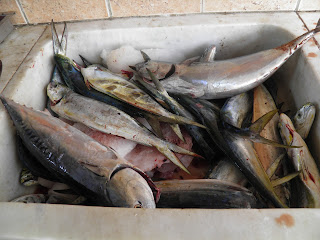My nephew Sam had his name day on 20 August. Bet you didn't know you had a name day, Sam. Saint Samouel. Next year you can celebrate your name day in NZ or put the pig on the spit along with a roll of offal here on Poros. You've learnt all K's traditional Greek roasting secrets. Only this time we'll fry the ears and make the head into brawn. Beers on us.
Agios Andrianos and Agia Natalia - 26th August
There is a small church near us dedicated to these saints which has an unusual story. Under one of the icons of Mary and Christ there is a small hole which looks only large enough for a small child to pass through.

However, apparently, if you have faith, no matter how well built you are, you will be able to get through the gap. Sometime we'll go and find out for ourselves though I don't think I'll chance getting stuck and having the firebrigade pulling me out.
Agios Fanourios - 27th August
Agios Fanourios is a saint whose help I often ask for. He finds what is lost, opening your eyes often to something that is right in front of you. If you lose your purse, your keys or a goat that has strayed you promise to make a 'fanouropita', cake with either 7 or 9 ingredients and without eggs or dairy (recipe below). The saint will show you where you can find your misplaced object. I have made dozens of these cakes and I can only say that the results have been amazing. Even the girls track down their stuff this way though I often end up making the cake for them.
You must cut up the cake and divide it amongst friends and neighbours and as everyone eats it they say 'God forgive the mother of Agios Fanourios' who was one of those engaged in the world's oldest profession and a real meany.
In Italy it is Saint Anthony who finds lost objects and in the village of Oulx they make the Torta di Sant'Antonio, an apple and red wine tart.
Agios Yiannis of the split pea (tou fava) - 28th August
Outside the small village of Damala near the ruins of Troizina there is a small white church built in the river bed and probably made with stone from the ancient ruins all around. The church has its fiesta on this day, housewives make fava (split pea puree) and the little village of Damala fills up with churchgoers who after lighting a candle at the church will go down to the main square for spit roast pig, music, wine, dancing and celebration till early morning.
This little church has a tradition of its own. On one side is a small window and all the children clamber through it to bring them good health during the year. They also leave behind an item of clothing, usually underpants so I'm told, clean ones I hope and not those they were wearing. My son-in-law was taken to the church every year as a child and is now a very healthy specimen of greek manhood so I guess it works.
Agios Alexandros - 30 August
Not much to say about this one, just that it comes after the others.
Fanouropita - easy-peasy
7 and 9 are holy numbers, hence the amount of ingredients. Here is a recipe from our neighbour which is one of the best. She makes it for church fiestas and memorials to hand out after the service. The traditional recipe uses raisins but the grandkids prefer dark choc drops (no dairy) instead.
500 grams self-raising flour
1 tsp cinnamon
1 cup of oil (we use olive oil but you could use any vegetable oil)
1 cup of sugar
1 water glass of orange juice (12 tablespoons)
1/2 cup of water
1 level tsp baking powder
lemon zest
1 cup of raisins
(icing sugar to sprinkle over the top)
Put the raisins into the orange juice for ten minutes.
Mix dry ingredients, add wet and 'Bob's your Uncle'
Put into an oblong tin. It will not rise very much.
Cook 30 minutes at about 180o Celsius and sift the top with icing sugar before serving.
This does come out rather crumbly but is a really nice cake. Try it with or without a pledge to the saint.
You can also make the cake in hope of finding good health, happiness, true love or a new job. In Cyprus apparently seven slices of cake should be given to seven married women that have only been married once, widows and divorcees acceptable. It works for us with seven kids or seven cads, as long as they're hungry.















































.png)





















